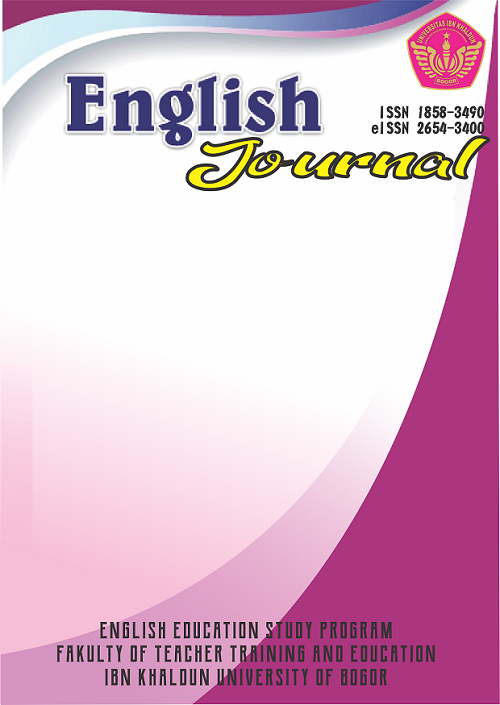TEACHERS' PERSPECTIVE OF ICT INTEGRATION ON ELT
DOI:
https://doi.org/10.32832/english.v17i1.13796Abstract
In the 21st century, technology has become the most powerful development in the world. In the last two decades, digital usage has influenced every aspect such as economic, social, political, and education fields. Along with developments that occur every day, in the realm of education, the curriculum has changed in recent years where K13 prioritizes the use of ICT in schools. This study conducted a descriptive qualitative research design that proposed to know teachers' perspective of ICT integration on ELT, specifically about the transition during online to offline class, teacher preparation of using ICT, the effectiveness of using ICT in the class, the obstacle faced when using ICT, students achievement, the use of ICT compared with conventional media, and teachers' interest on ICT. The participants were two English teachers of SMPN 1 Singosari who have applied teaching with ICT and conventional, and using in-depth interview to collect the data. The result revealed that the teachers have interest in studying ICT but still using conventional media. It implied that there was something that needed to be fixed to maximize the use of ICT in the classroom. Furthermore, it is recommended that socialization and training sessions are frequently held to upgrade the expertise and skills in teaching English.
References
Ahmad, D. (2014). Understanding the 2013 Curriculum of English Teaching through the Teachers"Ÿ and Policymakers"Ÿ Perspectives. International Journal of Enhanced Research in Educational Development (IJERED), 2(4), 6–15.
Al Harbi, H. E. (2014). Towards Successful Implementation Of ICT In Education. The 2014 WEI International Academic Conference Proceedings, 33–45.
Brantley-Dias, L., & Ertmer, P. A. (2013). Goldilocks and TPACK: Is the construct "just right?” Journal of Research on Technology in Education, 46(2), 103–128. https://doi.org/10.1080/15391523.2013.10782615
Dilmaghani, M. (2003). Information technology in educational programs of the countries, The monthly growth of educational technology.
Ekberg, S., & Gao, S. (2018). Understanding challenges of using ICT in secondary schools in Sweden from teachers' perspective. International Journal of Information and Learning Technology, 35(1), 43–55. https://doi.org/10.1108/IJILT-01-2017-0007
Ghavifekr, S., & Rosdy, W. A. W. (2015). Teaching and learning with technology: Effectiveness of ICT integration in schools. International Journal of Research in Education and Science, 1(2), 175–191. https://doi.org/10.21890/ijres.23596
Grimus, M. (2000). ICT and multimedia in the primary school. 16th Conference on Educational Uses of Information and Communication Technologies.
Hadid, W., & Jurich, S. (2000). ICT for education ; potential and potency.
Harmer, J. (2010). The_Practice_of_English_Language_Teachin.pdf (p. 386). https://www.academia.edu/25472823/The_Practice_of_English_Language_Teaching_4th_Edition_Jeremy_Harmer
Hermawan, H. D., Deswila, N., & Yunita, D. N. (2018). Implementation of ICT in Education in Indonesia during 2004-2017. Proceedings - 2018 International Symposium on Educational Technology, ISET 2018, 2004, 108–112. https://doi.org/10.1109/ISET.2018.00032
Koehler, M. J., Mishra, P., & Cain, W. (2013). What is Technological Pedagogical Content Knowledge (TPACK)? Journal of Education, 193(3), 13–19. https://doi.org/10.1177/002205741319300303
Lanigan, J. D. (2009). A sociotechnological model for family research and intervention: How information and communication technologies affect family life. Marriage and Family Review, 45(7–8), 587–609. https://doi.org/10.1080/01494920903224194
Maxwell, J. . (2008). Designing a qualitative study. The SAGE Handbook of Applied Social Research Methods, 2, 214–253.
McKenney, S., & Visscher, A. J. (2019). Technology for teacher learning and performance. Technology, Pedagogy and Education, 28(2), 129–132. https://doi.org/10.1080/1475939X.2019.1600859
Nuraeni, Y., MS, Z., & Boeriswati, E. (2020). A Case Study of Curriculum Implementation and K-13 Challenges in Indonesia. International Journal for Educational and Vocational Studies, 1(8), 14. https://doi.org/10.29103/ijevs.v2i1.2263
Pamuk, S., Ergun, M., Cakir, R., Yilmaz, H. B., & Ayas, C. (2015). Exploring relationships among TPACK components and development of the TPACK instrument. Education and Information Technologies, 20(2), 241–263. https://doi.org/10.1007/s10639-013-9278-4
Patel, M. ., & Jain, P. M. (2008). English language Teaching. In SUNRISE PUBLISHERS & DISTRIBUTORS. https://doi.org/10.1093/ywes/XXXVI.1.44
Rabah, J. (2015). Benefits and challenges of information and communication technologies (ICT) integration in Québec english schools. Turkish Online Journal of Educational Technology, 14(2), 24–31.
Raja, R., & Nagasubramani, P. C. (2018). Impact of modern technology in education. Journal of Applied and Advanced Research, 3, S33–S35. https://doi.org/10.21839/jaar.2018.v3is1.165
Review, A. L., & Noor-ul-amin, S. (2003). An Effective use of ICT for Education and Learning by Drawing on Worldwide Knowledge , Research , and Experience : ICT as a Change Agent for Education Abstract : 1999, 1–13.
Saddhono, K., Sudarsana, I. K., & Iskandar, A. (2019). Implementation of Indonesian Language the learning Based on Information and Communication Technology in Improving Senior High School Students' Achievement in Surakarta. Journal of Physics: Conference Series, 1254(1). https://doi.org/10.1088/1742-6596/1254/1/012059
Shyamlee, S., & Phil, M. (2012). Use of technology in English language teaching and learning: An analysis. A Paper Presented at the 2012 International Conference on Language, Medias and Culture IPEDR Vol.33 (2012) ©(2012) IACSIT Press, Singapore, 33(2012), 150–156. http://www.ipedr.com/vol33/030-ICLMC2012-L10042.pdf
Tristiana, N. E., & Rosyida, E. (2018). Students' Perception on the Integrating of Information and Communication Technology (ICT). English Education: Jurnal Tadris Bahasa Inggris, 11(1), 35–44. http://ejournal.radenintan.ac.id/index.php/ENGEDU/article/view/2666
YOLAGELDć°Lć°, G., & ARIKAN, A. (2011). Effectiveness of Using Games in Teaching Grammar to Young Learners. Elementary Education Online. ERIC, 10(1), 219–229. https://doi.org/10.1109/mikon.2004.1356893
Yufrizal, H. (2017). Teachers and students ' perceptions of communicative competence in English as a foreign language in Indonesia. 12(17), 867–883. https://doi.org/10.5897/ERR2017.3243

















1.png)




